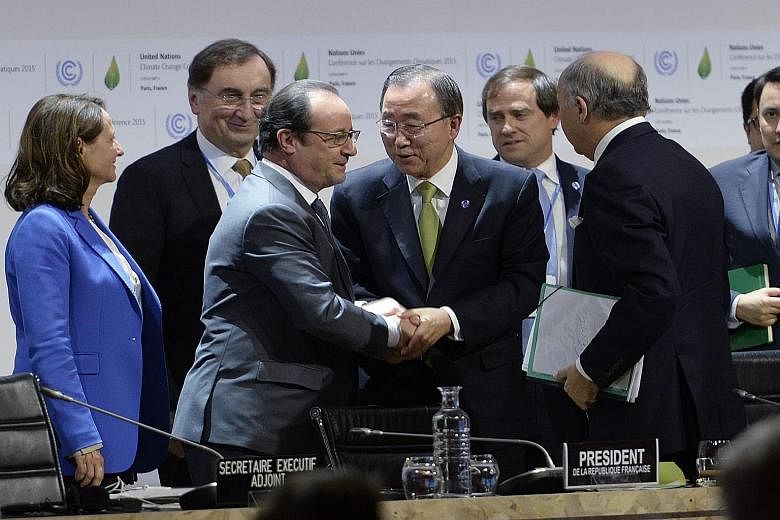After more than two decades of often-bitter negotiations, a mission to seal a historic pact to save the planet from wilder weather and hotter temperatures edged towards the finishing line here yesterday.
A final draft text was handed to ministers and delegates to study before, hopefully, they approve it.
Following two weeks of marathon discussions and all-night meetings, the French government and the United Nations hoped the final text would be adopted by nearly 200 nations. French President Francois Hollande, UN Secretary-General Ban Ki Moon and French Foreign Minister Laurent Fabius implored delegates to make history and support the agreement.
"The decisive agreement for the planet is here and now," Mr Hollande told delegates, urging them to adopt the world's first truly global pact to fight climate change.
The Paris talks aim to commit all nations to put the brakes on climate change. As the world warms, millions of people have been affected by extreme weather. With 2015 set to be the hottest year on record, getting an agreement has become urgent. The French and world leaders have pushed negotiators hard, saying this was the best opportunity to do a deal. Talks ran deep into overtime, with disputes over funds for poorer nations, monitoring of national action plans and who should take the lead in fighting climate change bogging down negotiations.

The 31-page final text contains a goal to limit warming to 1.5 deg C, a victory for vulnerable, small island states which demanded that big polluting nations agree on a more ambitious target than 2 deg C. It sets out five-year reviews for national climate action plans, a key demand for rich nations. It also sets out cooperation on loss and damage for poorer states which want assistance for destruction wrought by extreme weather and higher seas.
"Our responsibility to history is immense," said Mr Fabius, the president of the talks, in an impassioned speech in which he praised exhausted negotiators. He said the draft contained elements that he felt would have been impossible to achieve previously.
But in a warning, he said: "Today, if unfortunately we were to fail, how could we rebuild this hope? Trust in the very ability of a concert of nations to obtain results for climate would be irrevocably lost."
India and China, which were seen as potential stumbling blocks to the deal, were quick to back it. "We're happy with the agreement. We think it is balanced," said the bloc's spokesman Gurdial Singh Nijar.
The global climate deal is basically a new economic blueprint for the planet because it aims to cut greenhouse gas pollution from burning fossil fuels, deforestation, and agriculture that is heating up the atmosphere and oceans. If nations follow through on their pledges and increase their emissions cuts, it will mean a transformation of how energy is produced and how efficiently it is used.
- SEE WORLD

